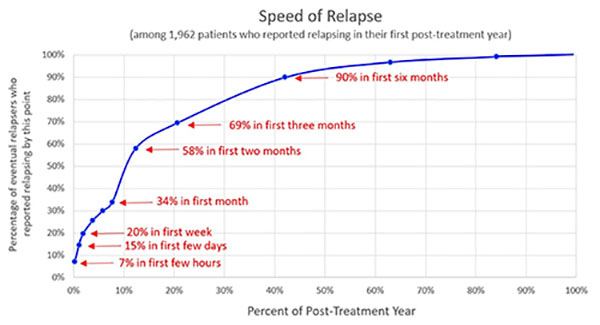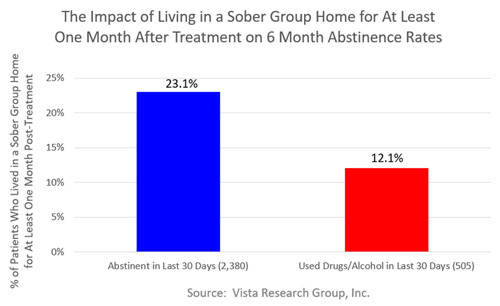Your child has finally (praise God!) agreed to go to rehab and, after a few weeks of not using drugs or alcohol, glimpses of his or her sweet, lovable self are reappearing. Now treatment is ending and your child is earnestly assuring you that he or she will be able to return home and never drink or use drugs again. What’s a parent to do?
I’m sorry to say this after the hell you’ve been through, but my recommendation is:
Don’t Believe Them
The first weeks after residential treatment are very, very dangerous times. Research shows that 15% of the patients who start using again during their first post-treatment year will relapse during the first week. One-third will relapse in the first month:

While some of the individuals who relapsed quickly had left treatment against medical advice, many had not. In fact, of the 20% who started using drugs or alcohol in their first week after leaving treatment, almost half (45%) had successfully completed all recommended treatment and appeared to be on the road to recovery.
Addiction is an insidious, chronic disease. While it’s possible to remain abstinent after returning to the people, places and things that are vivid reminders of drug and alcohol use, the sad truth is that it’s unlikely.
Think of sobriety like a muscle. The longer someone is able to stay drug- and alcohol-free, the more likely they’ll have the strength to ignore their overwhelming cravings when confronted with the opportunity to use again.
Vista Research Group’s research shows this in multiple ways. First, the likelihood that someone will be reachable and abstinent one year after treatment is directly related to the length of time that person remains in treatment:

Unfortunately, the high cost of treatment combined with the refusal of insurance companies to cover long treatment stays means your child is unlikely to spend as long in treatment as you would like. In response, I highly recommend you look for a reputable group home that can provide a sober support structure for your child as he or she transitions back to “the real world”. Here's our advice on how to find a good sober living home near you.
I am quite confident my daughter would not be alive today if she hadn’t lived in sober group homes for 6 months after her first treatment and later for another 13 months. Whenever we tried having her move back home with us, she would quickly start drinking again. And for reasons I still don’t completely understand, I was invariably one of the last to recognize when she was drinking.
Moving to a sober living home after treatment is relatively common. Among 2,380 patients in Vista’s research who were reachable and said they were not using drugs or alcohol six months after leaving treatment, almost one-quarter (23.1%) of them had lived in a sober living home for at least one month after treatment. By comparison, only half that many (12.1%) who reported using drugs or alcohol at six months had lived in a sober living home for a month or more:

Looked at another way, among patients who submitted one month or six month post-discharge surveys, 15% more individuals who had lived in a sober living home for at least a month were reachable and abstinent at one year post-treatment than those who didn’t. Even more impressively, 37% more patients who had lived in a sober living environment for at least six months were reachable and claimed to not be using drugs or alcohol one year post-treatment compared to patients who didn’t attend sober living:

Note: The abstinence percentages above are inflated, because patients submitting no outcomes surveys are excluded.
If you want to maximize your son’s or daughter’s chances of achieving long-term recovery, ask their treatment team or other trusted experts to recommend one or more reputable sober living homes your child could move into directly after treatment. A good group home will provide structure and oversight as your child develops the support network, friendships, and habits necessary to stay sober in a stressful world. If you can't get a recommendation from someone you trust, here's how to find a good recovery residence on your own.


![Why Sending Your Child to Sober Living Could Save Their Life [DATA]](/sites/default/files/2021-07/Soberliving%20hero.jpg)




